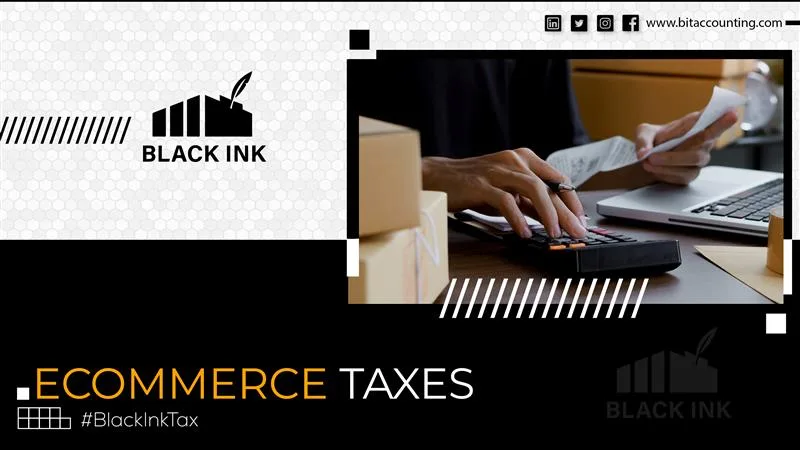
Table of Contents
eCommerce Taxes 101: Everything Online Sellers Need to Know
It sounds fun to sell things online, until you have to pay taxes. If you run a small eCommerce store from your bedroom or ship things all over the world through Amazon, you need to know about eCommerce taxes. It’s the fact that the internet creates a lot of new chances, but it also comes with its own set of tax related problems that every seller should be ready for.
In this article, we will understand the basics of eCommerce taxes in the easiest way possible if you’re a new seller, a small business owner, or a dropshipper. You’ll learn how to stay in compliance, avoid fines, and keep more money in your pocket.
Understanding eCommerce Taxes
So, what are eCommerce taxes? These are taxes applied to online sales of products or services. While they share some similarities with traditional retail taxes, there are big differences too—especially when your customer could be located anywhere in the country (or the world).
Why eCommerce Taxes Matter
You may wonder why these taxes matter. But the thing is, paying attention to tax rules isn’t just about avoiding financial trouble, it can actually help your business grow. Here is how:
- Stay compliant with the law: Avoid audits, fines, or legal issues with the government.
- Protect your profits: Proper tax planning means more accurate pricing and better revenue control.
- Build trust: Customers appreciate transparency and feel more secure buying from a compliant seller.
Ignoring taxes doesn’t just hurt your wallet—it can harm your store’s reputation, too.
Common Types of eCommerce Taxes
Now you understand the importance of eCommerce taxes. Let’s look at the most common taxes you might encounter as an online seller:
- Sales Tax: This type of tax is collected at the state or local level when you sell taxable goods.
- Income Tax: This tax is based on your eCommerce store’s profits, paid to the IRS, your state, and sometimes your city.
- VAT (Value-Added Tax): This type of tax is common in Europe, the UK, and Canada, and is needed if you sell internationally.
- Marketplace Facilitator Taxes: Big sharks like Amazon and eBay may collect and pay taxes on your behalf. Laws vary by state, and this was influenced by the court case South Dakota v. Wayfair, Inc.
Sales Tax for eCommerce Sellers
Sales tax rules changed intensely after the Wayfair case. Now, even if you don’t have a physical store in a state, you might still owe taxes there.
States like California, Texas, and New York have strict rules about this law.
When and Where to Collect Sales Tax
Each state has different rules about how and where to collect sales tax. Some are origin-based (tax is based on your business location), while others are destination-based (based on where the customer lives).
Tools to help you calculate sales tax:
- TaxJar
- Avalara
- QuickBooks
These tools help with automation and reduce compliance costs.
Registering for a Sales Tax Permit
Before you collect sales tax, you need a permit. Here’s how:
- Apply through your state’s Department of Revenue.
- Pay any fees, if required.
- Start collecting and submitting taxes regularly (monthly, quarterly, or annually).
Exemptions and Special Cases
Some products or buyers are tax-exempt:
- Resale certificates: If you’re buying goods to resell (like in dropshipping).
- Tax-exempt items: Clothing and groceries in some states.
- Nonprofits or government buyers: These customers may not owe tax, but you need to keep proper records.
Income Tax for eCommerce Businesses
Even if you never charge sales tax, you still need to pay income tax on your profits.
Business Structures That Affect Taxes
- Sole Proprietorship: Simple, but you’re personally liable.
- LLC: Offers flexibility and protects your personal assets.
- S-Corp / C-Corp: S-Corp and C-Corp may help reduce your tax bill, but require more paperwork.
You’ll also pay self-employment tax if you’re running your store alone.
Quarterly Estimated Tax Payments
You may need to send tax payments four times a year:
- Use IRS Form 1040-ES to calculate what you owe.
- Send payments by the deadlines.
- Avoid penalties by paying at least 90% of your estimated tax.
Tax Deductions and Credits for Online Sellers
Here’s where you can save money:
- Home office deduction, if you work from home.
- Inventory and shipping costs
- Advertising and marketing tools
- Software subscriptions like Shopify or Mailchimp

International eCommerce Taxes
If you are selling across borders, then taxes get trickier and hard to understand. Let’s understand how:
VAT (Value Added Tax) for Global Sellers
- Required in the EU, UK, and some other countries.
- You may need to register if your sales pass a certain amount (called a threshold).
- EU sellers can use the OSS/IOSS system to file VAT more easily.
Customs Duties and Import Taxes
- If you’re selling to customers abroad, they might owe customs fees.
- Know the difference between DDP (Delivered Duty Paid) and DDU (Delivered Duty Unpaid).
- Always communicate clearly to avoid unhappy buyers.
Selling on International Marketplaces
Platforms like Amazon and eBay offer tools to help with taxes:
- Amazon VAT Services handle registration and filing.
- eBay Global Shipping Program simplifies the process.
The eCommerce Taxes Best Practices
eCommerce tax rules are constantly changing. Here’s how to stay ahead.
#1 Automating Tax Compliance
Use software to handle the heavy lifting:
- TaxJar, Avalara, Quaderno for tax tracking.
- Plug these into platforms like Shopify, WooCommerce, and BigCommerce.
#2 Record-Keeping for Tax Purposes
Keep track of:
- Receipts, invoices, sales reports
- Bank and payment processor records
- Business expenses
Use cloud-based accounting software like QuickBooks, Xero, or Wave.
#3 Avoiding Common Tax Mistakes
- Don’t forget to register in states where you have nexus.
- Avoid mixing personal and business expenses.
- File your taxes on time to avoid back taxes or penalties.
Future Trends in eCommerce Taxation
Tax laws are evolving fast:
- Digital sales tax laws are being adopted worldwide.
- Cryptocurrency earnings may be taxed as income.
- AI and automation are helping sellers handle regulatory compliance with less stress.
Conclusion
Understanding eCommerce taxes isn’t optional—it’s essential to running a successful online business. From sales tax and income tax to VAT and international rules, staying informed helps you stay compliant and profitable. Use tools, keep good records, and stay on top of the rules.
Need expert help? BIT Accounting offers support specially customized to online sellers like you—so you can focus on growing your store while we handle the tax maze.
FAQs
1: Do I need to collect sales tax in every state?
Not necessarily. Only in states where you have nexus—which can be physical or economic.
2: What is the Streamlined Sales Tax Project?
It’s an effort by U.S. states to simplify sales tax rules and make it easier for online sellers to comply.
3: How do I handle taxes on Etsy, Amazon, or eBay?
These platforms may collect and pay taxes for you, depending on the state laws.
4: Can I write off advertising expenses?
Yes, marketing costs are often deductible.
5: What happens if I ignore taxes?
You could face audits, fines, and even legal trouble.
GET FREE QUOTE FOR ALL OF OUR SERVICES
Black Ink will send you a free analysis of your current state and what would be the cost of managing either a separate accounting and bookkeeping services or a complete solution across New York, USA. Do get in touch and we will be happy to consult you with our bookkeeping services in NY, New York, USA.
